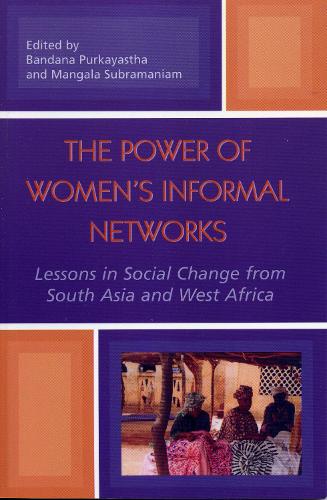
The Power of Women's Informal Networks: Lessons in Social Change from South Asia and West Africa
(Paperback)
Publishing Details
The Power of Women's Informal Networks: Lessons in Social Change from South Asia and West Africa
By (Author) Bandana Purkayastha
Edited by Mangala Subramaniam
Contributions by Alayne M. Adams
Contributions by Bianca Ambrose-Oji
Contributions by Kumkum Bhattacharya
Contributions by Lucy Creevey
Contributions by Kathleen Fallon
Contributions by Shobha Hamal Gurung
Contributions by Shahanara Husain
Contributions by Sangeetha Madhavan
Bloomsbury Publishing PLC
Lexington Books
10th March 2004
United States
Classifications
General
Non Fiction
Gender studies, gender groups
Gender studies: women and girls
305.406054
Physical Properties
Paperback
154
Width 161mm, Height 227mm, Spine 13mm
236g
Description
In contemporary discussions of gender relations around the world, a gap often exists between theorywhich overemphasizes generalized units such as "international" or "developing"and the complex ways that global and local forces interact to structure womens lives in specific countries and regions. Analyses of movement dynamics on the global level contribute to our understanding of women's activism across borders but do not highlight localized politics spearheaded by poor women. Too often, editors Bandana Purkayastha and Mangala Subramaniam have found, marginalized groups in rural or impoverished areas are overlooked by the international economy of knowledge. The Power of Women's Informal Networks describes and evaluates social organization among poor women in South Asia and West Africa. The contributors to this important new collection of essays draw our attention to these small-scale but politically and socially significant networks as they focus on both agency and the situated contexts within which women work together to improve their lives.
Reviews
This exciting book goes beyond furthering our understanding of the complex inter-linkages between poor womens localized politics and transnational global processes. It is a major contribution toward connecting paradigm and praxis, thus challenging and expanding the boundaries of mainstream scholarship. -- Yakin Ertrk, Middle East Technical University; UN Special Rapporteur on Violence against Women
This volume breaks new ground in the study of women's social capital in the Global South through an exploration of informal networks among poor women in several South Asian and West African societies. Theoretically and empirically, this book transcends previous works in this field in its use of the intersectionality thesis by emphasizing such features as the impact of Islam and Hinduism on the experiences of poor women. In each case study, this work examines the distinctiveness of women's informal networks as illustrated in their family-kin relations, the world of work, and their relationships to politics and the state in regions of the world that are not typically compared, let alone included in the same volume. Further, this book also demonstrates how local, national, and global forces interact in structuring the poverty that women experience, particularly noting the growing importance of informal networks in periods of economic crisis and structural adjustment. Moreover, this is a balanced treatment ofwomen's informal networks that reveals both the positive and the negative consequences of various examples of social capital. Despite the poverty that these women experience, they are important change-agents in their societies and are empowered through t -- Mary Johnson Osirim, Bryn Mawr College
The Power of Women's Informal Networks provides a much-needed look at the processes behind women's collective action for change. It makes clear that resistance as well as inequality has a local face, and counters the over-broad generalizations about 'women' and 'development' that appear in the literature. By focusing on specific sites in Africa and South Asia, the book takes an important step toward developing globally inclusive knowledge that is deeply grounded in particular local conditions and perspectives. -- Myra Marx Ferree, University of Wisconsin--Madison
This volume breaks new ground in the study of women's social capital in the Global South through an exploration of informal networks among poor women in several South Asian and West African societies. Theoretically and empirically, this book transcends previous works in this field in its use of the intersectionality thesis by emphasizing such features as the impact of Islam and Hinduism on the experiences of poor women. In each case study, this work examines the distinctiveness of women's informal networks as illustrated in their family-kin relations, the world of work, and their relationships to politics and the state in regions of the world that are not typically compared, let alone included in the same volume. Further, this book also demonstrates how local, national, and global forces interact in structuring the poverty that women experience, particularly noting the growing importance of informal networks in periods of economic crisis and structural adjustment. Moreover, this is a balanced treatment of women's informal networks that reveals both the positive and the negative consequences of various examples of social capital. Despite the poverty that these women experience, they are important change-agents in their societies and are empowered through their informal networks. -- Mary Johnson Osirim, Bryn Mawr College
Author Bio
Bandana Purkayastha is assistant professor of sociology and Asian American studies at the University of Connecticut. Mangala Subramaniam is assistant professor of sociology and women's studies at Purdue University.
